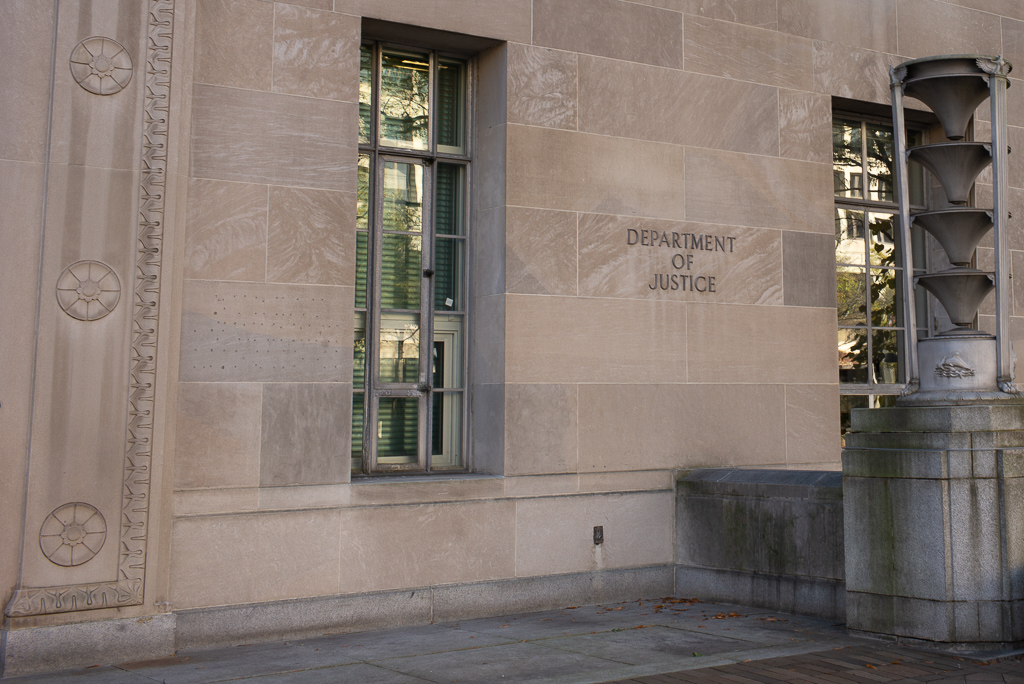Yes, Bill Barr’s Memo Really is Wrong About Obstruction of Justice
In a New York Times op-ed last Friday, we wrote that William Barr, who served as attorney general under President George H.W.

Published by The Lawfare Institute
in Cooperation With

In a New York Times op-ed last Friday, we wrote that William Barr, who served as attorney general under President George H.W. Bush and has been nominated by President Trump for that post again, had seriously damaged his credibility by sending an unsolicited and poorly reasoned memo to the Justice Department and the White House arguing that Special Counsel Robert Mueller “should not be permitted to demand that the President submit to interrogation about alleged obstruction.” At the National Review, Andrew McCarthy says that our op-ed is “surprisingly vapid” and that the Barr memorandum’s legal advice is “sound.” We explain below why McCarthy’s arguments are mistaken.
The Bribery Debate
Barr argues that “statutes that do not expressly apply to the President must be construed as not applying to the President if such application would involve a possible conflict with the President’s constitutional prerogatives.” Barr’s claim, we said, was too broad because it would shield the president from “a host of uncontroversial laws” such as the federal bribery statute. After all, the president has the constitutional prerogative to nominate (and with the advice and consent of the Senate, appoint) members of his own Cabinet, but no one thinks that the president can therefore sell off Cabinet posts to the highest bidders.
McCarthy responds by disputing our premise that the president is subject to federal bribery law. He writes that the bribery statute, 18 U.S.C. §201, “clearly does not apply to the president” because the statute applies only to “public officials” and the president and the vice president are not included in the statute’s list of public officials. Never mind that the definition of “public official” includes any “person acting for or on behalf of the United States.” Because the statute does not mention the president, McCarthy asserts, it does not apply to him. McCarthy, moreover, attributes all of this to “the Justice Department’s well-established position” on the subject.
In fact, the Justice Department’s position is the opposite. According to a 1995 Office of Legal Counsel opinion, “the Department of Justice has construed the federal bribery statute as applying to the President even though it does not expressly name the President.” Now, McCarthy might disagree with the Justice Department’s position, but that is indeed the Justice Department’s position.
Why does the Office Legal Counsel, an executive-branch office that takes a famously latitudinarian approach to presidential power, nonetheless reject the view that McCarthy takes? One clue is that McCarthy’s perspective, if taken seriously, would mean not only that the president could take a bribe without fear of criminal liability but also that anyone else could bribe the president without fear of criminal liability. That’s because the bribery statute applies to anyone who “corruptly gives, offers or promises anything of value to any public official ... to influence any official act,” and to anyone who “being a public official ... , corruptly demands, seeks, receives, accepts, or agrees to accept anything of value ... in return for ... being influenced in the performance of any official act.” So if—as McCarthy claims—the president and vice president are not “public officials,” bribing them would not be a crime. Why Congress would want to criminalize bribery of everyone else in the federal government except for the No. 1 and No. 2 officials is a mystery that McCarthy does not seek to solve.
We also strongly suspect that Barr disagrees with McCarthy or is at least too prudent to agree with him publicly. But, inspired by McCarthy’s argument, we hope that at Barr’s confirmation hearing, senators ask him whether he believes that the federal bribery statute applies to the president. If Barr says that it doesn’t, then we suspect that senators will be reluctant to confirm him. If he does not, then the burden is on him to reconcile his position on bribery and his position on obstruction of justice.
The “Facially Lawful” Façade
McCarthy next defends Barr’s curious construction of 18 U.S.C. §1512(c), which makes it a crime to “corruptly” hide physical evidence “or otherwise obstruct[] ... any official proceeding.” Barr concedes that “if a President knowingly destroys or alters evidence, suborns perjury, or induces a witness to change testimony, or commits any act deliberately impairing the integrity or availability of evidence, then he, like anyone else, commits the crime of obstruction.” But Barr claims that the obstruction statutes cannot extend to “facially-lawful acts taken by the President in exercising the discretion vested in him by the Constitution.”
In our op-ed , we argued that Barr’s distinction between “evidence impairment” and “facially-lawful acts” is illusory. We noted that tearing up a piece of paper is “facially lawful,” while tearing up a piece of paper so that it can’t be subpoenaed by a federal prosecutor is obstruction. Indeed, the whole reason we have obstruction statutes is to criminalize otherwise-legal acts that impede law enforcement functions.
McCarthy says that our paper-tearing example misses the nuance of Barr’s argument. “Of course, Barr was not talking about any facially lawful acts,” McCarthy writes. Barr “was addressing facially lawful acts that are constitutional prerogatives of the presidency.”
Well, we think that establishing policies regarding the retention and disposal of records almost certainly falls within the president’s executive power (subject to the limits of the Presidential Records Act, just as other exercises of executive power can be limited by appropriate legislation). But we’ll try a different example to see if it makes the point more clearly. First, ask: Does the president’s executive power allow him to direct the White House’s chief usher to take out the Oval Office trash? Of course it does. Whatever the Constitution means when it says that the “executive power shall be vested in a President,” it must mean that the president has the power to oversee his own office.
Now imagine that the president’s Oval Office trash contains a smoking gun. (It could be a figurative “smoking gun” or a literal one that the president just used to, say, shoot a political rival.) What if the president directs the chief usher to take out the Oval Office trash then? Is that obstruction? Again, yes. The fact that directing the chief usher to throw out the trash is a facially lawful exercise of the president’s constitutional prerogatives under most circumstances does not make it lawful under all circumstances.
Here’s another hypothetical. President Clinton was accused of obstructing justice by asking his friend Vernon Jordan to help Monica Lewinsky find a private sector job in order to influence her testimony. Would it have been against the law if (counterfactually) Clinton had offered Lewinsky the ambassadorship to Switzerland in exchange for her lying under oath? Barr would presumably say yes: That’s suborning perjury. But of course, the president has the constitutional prerogative to nominate ambassadors. An action that otherwise would be a lawful exercise of executive power ceases to be such when it’s done to corruptly obstruct an official proceeding. The distinction between evidence impairment and “facially lawful” acts falls apart.
Obstruction and Collusion
McCarthy goes on to stick up for Barr’s unsustainable claim that “Mueller should not be permitted to interrogate the President about obstruction until he has enough evidence to establish collusion.” Barr’s theory—picked up by McCarthy—seems to be that if Trump can obstruct justice so successfully that his collusion with Russia is obscured, then he is off the hook for obstruction and for collusion. We said that theory was “[n]onsense,” and it gets no better in McCarthy’s second telling. To apply Barr’s theory would be to reward obstruction rather than to punish it.
Recall, moreover, that Deputy Attorney General Rod Rosenstein’s charge to Mueller was to investigate, among other subjects, “any links and/or coordination”—criminal or not—between the Russian government and the Trump campaign. Even if the coordination between the Trump campaign and Russia didn’t break any laws, it still would be a proper topic for the special counsel’s probe. If Trump sought to impede that inquiry, then he obstructed (or attempted to obstruct) an official proceeding. The question then would be whether he did so “corruptly”—which is a question about Trump’s state of mind, upon which an “interrogation” of the president would shed light.
The Starr Comparison
In our op-ed, we also noted the incongruence between Barr’s memo and a statement he signed in 1998 arguing that Kenneth Starr, who was an independent counsel at the time, should be allowed to carry out his investigation unimpeded. Barr and his co-signers observed at the time that Starr was “effectively prevented from defending himself and his staff because of the legal requirements of confidentiality and the practical limitations necessitated by the ongoing investigations.” Barr and the others concluded that “[t]he counsel’s service can then be judged ... when the results of the investigation and the facts underlying it can be made public.”
McCarthy sees no tension between Barr’s comments now and then. We disagree. Barr acknowledges in his newly revealed memo that he is “in the dark about many facts” and that he doesn’t know what Mueller’s theory of obstruction might be. He nonetheless says—without equivocation—that “Mueller should not be permitted to demand that the President submit to interrogation about alleged obstruction.” He also accuses Mueller of being “overly-aggressive” in his use of the obstruction laws and describes the pursuit of a “novel obstruction theory against the President” as “grossly irresponsible”—again, without knowing what the special counsel’s theory is. Barr, who once cautioned against jumping to conclusions regarding the Starr investigation, is now giving legal advice to the Justice Department and the White House—and impugning the work of the special counsel—based on suppositions that amount to shots in the dark.
The Unitary Executive
McCarthy ends by arguing that Barr’s analysis is rooted in a “venerable” theory of constitutional law that recognizes the president’s absolute power over the executive branch, namely, the “unitary executive theory.” Unfortunately, the meaning of this theory is far from clear, and McCarthy muddies the waters by invoking it. Originally, it simply meant that there is a single rather than plural executive—a position that the founders took and with which no one disagrees. Under a broader view, it means that the president has significant or possibly unlimited authority over officials in the executive branch—which is a possible view to hold but one that is at variance with constitutional practice since the founding era, and even more so over the last century. A third view is that Congress cannot subject the president to any laws. This latter view has sometimes been advanced, but not—as far as we know—by any judge or Supreme Court justice, and certainly not Justice Antonin Scalia, who ruled against presidential power on numerous occasions. Even the Office of Legal Counsel has refrained from taking this view. We’re not willing to assume that Barr takes such an extreme view, which would surely be disqualifying.
The Context
Need we remind anyone that this is not just any appointment? If George W. Bush had nominated Barr, and it was subsequently disclosed that Barr had earlier argued that the president is somehow immune from being questioned about obstruction of justice by a special counsel, we probably would have kept our mouths shut. But we are talking about a nomination by Donald Trump here. This president has made it clear that he does not take seriously limits on his power. He issued an order to fire the special counsel, and would have gone through with it if his White House counsel had not threatened to resign. And with his memo, Barr was not simply expressing his opinion on a matter of public importance. He was clearly sending a signal to the president that as attorney general, he would be even more supine than the traditionally deferential White House counsel.
Trump doesn’t respect the law, but he does recognize that when his subordinates resign, there are political as well as operational costs that are not always worth enduring. For that reason, it is especially important that the president be surrounded by officials who will check him when he oversteps his constitutional authority. Barr may well be capable of standing up to Trump. But the memo makes us skeptical.




.jpg?sfvrsn=8253205e_7)
-(1).jpeg?sfvrsn=70dcd68a_9)
